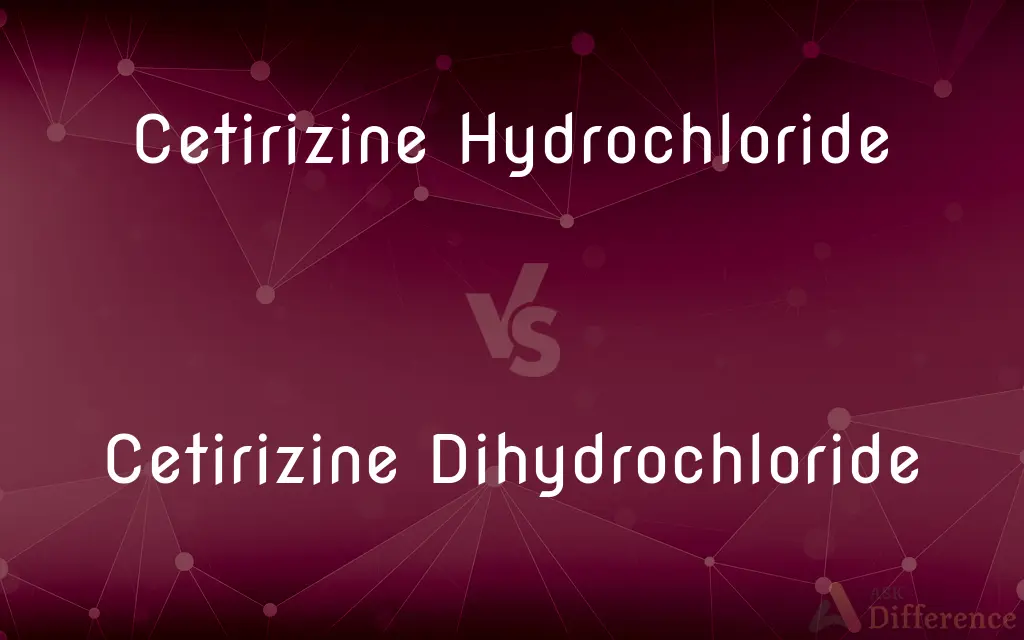Cetirizine Hydrochloride vs. Cetirizine Dihydrochloride — What's the Difference?
By Tayyaba Rehman — Published on January 8, 2024
Both are forms of Cetirizine, an antihistamine, with the difference being in their chemical composition - one with hydrochloride and the other with dihydrochloride.

Difference Between Cetirizine Hydrochloride and Cetirizine Dihydrochloride
Table of Contents
ADVERTISEMENT
Key Differences
Cetirizine Hydrochloride and Cetirizine Dihydrochloride are two different salt forms of Cetirizine, which is a commonly used antihistamine for allergies. The primary difference lies in their chemical composition. Cetirizine Hydrochloride is Cetirizine combined with hydrochloride, while Cetirizine Dihydrochloride combines Cetirizine with dihydrochloride. This slight chemical difference may affect aspects like solubility and stability.
Both forms are used to treat the same conditions, including hay fever, allergic rhinitis, and urticaria (hives). They work by blocking the action of histamine, a substance in the body that causes allergic symptoms. However, the choice between Cetirizine Hydrochloride and Cetirizine Dihydrochloride might depend on factors like manufacturing processes, formulation requirements, or regional drug regulations.
In terms of efficacy, both Cetirizine Hydrochloride and Cetirizine Dihydrochloride are expected to provide similar relief from allergic symptoms as their active ingredient is Cetirizine. The choice between the two often comes down to the availability of the drug and the preference of the manufacturer.
The side effects and safety profile of both Cetirizine Hydrochloride and Cetirizine Dihydrochloride are generally similar, as the active antihistamine agent is the same. Common side effects may include drowsiness, dry mouth, and headache.
These medications are available over the counter in many countries, but it's important for users to check the specific compound they are using, especially if they have sensitivities or allergies to specific drug formulations.
ADVERTISEMENT
Comparison Chart
Chemical Composition
Combined with hydrochloride
Combined with dihydrochloride
Uses
Treats allergies, hay fever, urticaria
Treats allergies, hay fever, urticaria
Efficacy
Effective as an antihistamine
Effective as an antihistamine
Common Side Effects
Drowsiness, dry mouth, headache
Drowsiness, dry mouth, headache
Availability
Widely available over the counter
Also available over the counter
Compare with Definitions
Cetirizine Hydrochloride
Available over the counter for allergic reactions.
Cetirizine Hydrochloride can be purchased without a prescription at most pharmacies.
Cetirizine Dihydrochloride
Can cause similar side effects like drowsiness.
He avoids driving after taking Cetirizine Dihydrochloride due to its sedative effects.
Cetirizine Hydrochloride
An antihistamine combined with hydrochloride for allergy relief.
Cetirizine Hydrochloride is commonly used to reduce sneezing and itching caused by allergies.
Cetirizine Dihydrochloride
Used for similar purposes as Cetirizine Hydrochloride.
She uses Cetirizine Dihydrochloride to treat her seasonal allergies.
Cetirizine Hydrochloride
May cause drowsiness as a side effect.
After taking Cetirizine Hydrochloride, I sometimes feel sleepy.
Cetirizine Dihydrochloride
Treats allergic reactions and hay fever.
For quick relief from sneezing, I use Cetirizine Dihydrochloride.
Cetirizine Hydrochloride
Commonly used for treating allergic rhinitis and hives.
My doctor recommended Cetirizine Hydrochloride for my chronic urticaria.
Cetirizine Dihydrochloride
Available in pharmacies for over-the-counter purchase.
I picked up Cetirizine Dihydrochloride from the local drugstore.
Cetirizine Hydrochloride
Blocks histamine action in the body.
I take Cetirizine Hydrochloride during spring to manage hay fever symptoms.
Cetirizine Dihydrochloride
A variant of Cetirizine combined with dihydrochloride.
Cetirizine Dihydrochloride effectively alleviates my allergic symptoms.
Common Curiosities
Is Cetirizine Dihydrochloride available without a prescription?
Generally, yes, it's available over the counter.
What is Cetirizine Hydrochloride?
It's an antihistamine drug combined with hydrochloride, used for allergy treatment.
Are Cetirizine Hydrochloride and Dihydrochloride equally effective?
Yes, both are effective in treating allergies as they contain the same active ingredient.
What is Cetirizine Dihydrochloride?
Similar to Cetirizine Hydrochloride, it's an antihistamine combined with dihydrochloride.
Should I consult a doctor before taking Cetirizine Hydrochloride?
It's advisable, especially if you have other medical conditions or are on other medications.
Can I use Cetirizine Hydrochloride for hives?
Yes, it's commonly used to treat urticaria (hives).
Do Cetirizine Hydrochloride and Dihydrochloride interact with other drugs?
They can interact with certain medications, so it's important to consult a doctor.
Is there a major difference in the formulation of these two drugs?
The main difference lies in their chemical composition, but the active antihistamine is the same.
Can I drive after taking these antihistamines?
Caution is advised as they can cause drowsiness.
Can Cetirizine Dihydrochloride cause drowsiness?
Yes, drowsiness is a common side effect.
Can children take Cetirizine Dihydrochloride?
Yes, but dosage and age restrictions should be followed as per guidelines.
What are the common side effects of Cetirizine Hydrochloride?
They include drowsiness, dry mouth, and sometimes headache.
Can I switch between Cetirizine Hydrochloride and Dihydrochloride?
Yes, but it's best to consult a healthcare professional before switching.
Are these medications safe for long-term use?
Generally, they are safe, but long-term use should be discussed with a healthcare provider.
Are these drugs effective for pet allergies?
Yes, they are often used to treat pet-related allergic reactions.
Share Your Discovery

Previous Comparison
Trisodium Orthophosphate vs. Sodium Phosphate
Next Comparison
Pure Substance vs. MixtureAuthor Spotlight
Written by
Tayyaba RehmanTayyaba Rehman is a distinguished writer, currently serving as a primary contributor to askdifference.com. As a researcher in semantics and etymology, Tayyaba's passion for the complexity of languages and their distinctions has found a perfect home on the platform. Tayyaba delves into the intricacies of language, distinguishing between commonly confused words and phrases, thereby providing clarity for readers worldwide.












































